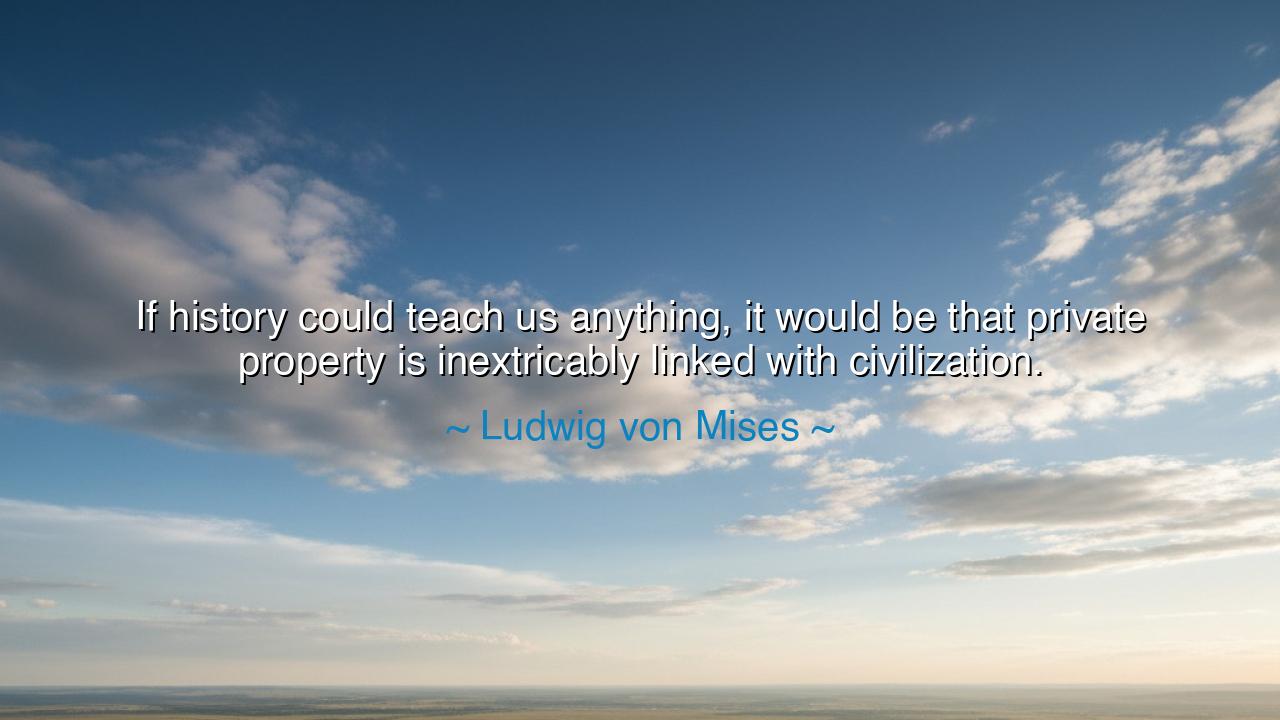
If history could teach us anything, it would be that private
If history could teach us anything, it would be that private property is inextricably linked with civilization.






Hearken, children of the ages, and open your minds to the wisdom of Ludwig von Mises: “If history could teach us anything, it would be that private property is inextricably linked with civilization.” Understand this: the foundations of society, the flourishing of trade, the security of families, and the progress of art and knowledge all rest upon the principle that individuals may possess, control, and exchange property. Civilization, like a mighty river, flows where rights are respected; it stagnates where ownership is denied or arbitrarily revoked.
From the dawn of human settlements, the ancients understood that stability arises when property is acknowledged and defended. In Mesopotamia, the codification of land rights and agricultural plots allowed cities to prosper along the fertile banks of the Tigris and Euphrates. Mises’ reflection resonates here: when individuals have a tangible stake in the fruits of their labor, society gains not only productivity but also order, justice, and the capacity for innovation. Private property and civilization are intertwined, each sustaining the other.
Even in classical Athens, the respect for private holdings formed a cornerstone of civic life. Citizens who owned land or homes were invested in the protection of the polis, in the creation of markets, and in the defense of law. Those without property were often dependent on others, with limited agency in public affairs. Mises’ insight underscores a universal truth: ownership provides both responsibility and incentive, enabling the advancement of culture, governance, and trade.
Consider the story of the Dutch Republic in the seventeenth century. Merchants, artisans, and farmers held property rights that were respected by law. Their ability to invest, trade, and innovate contributed to an unprecedented era of commerce, science, and art. Amsterdam became a beacon of civilization, not merely because of geography, but because private property empowered initiative, encouraged prudence, and nurtured civic engagement.
Even the tragic collapses of empires illustrate the peril of disregarding property rights. During periods when rulers seized lands arbitrarily, persecuted merchants, or confiscated wealth, societies fell into instability, rebellion, and economic stagnation. The lessons of history, Mises teaches, are clear: civilization falters when the sacred link between labor, ownership, and protection is broken. Property rights are not a mere convenience; they are the lifeblood of societal continuity and prosperity.
The lesson is profound: to nurture civilization, one must uphold and respect the rights of individuals to own, control, and exchange property. Security, creativity, and civic responsibility flourish where property is acknowledged. Without it, trust dissolves, labor is stifled, and human ingenuity is constrained. Mises’ reflection is a timeless admonition: the progress of humankind is inseparable from the recognition of private ownership.
Practical action follows naturally. Support laws, institutions, and practices that protect property rights. Honor the labor of others and recognize the value of their possessions. In your own life, cultivate respect for what belongs to others, and exercise stewardship over what belongs to you. Through this, you participate in the ongoing creation and preservation of civilization.
Children of the ages, remember this: the grandeur of cities, the prosperity of markets, and the advancement of knowledge rest upon the principle of property. Let the words of Ludwig von Mises guide your hand and heart: defend what is rightly yours, respect what is rightly held by others, and understand that civilization itself is built upon this sacred foundation. In this recognition lies both wisdom and the enduring strength of society.






AAdministratorAdministrator
Welcome, honored guests. Please leave a comment, we will respond soon